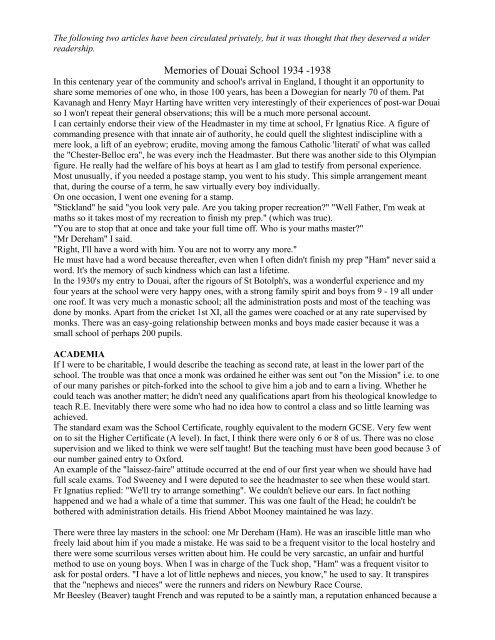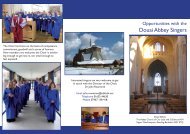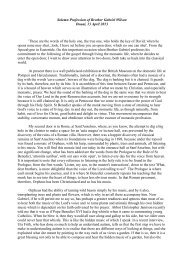The Douai Society Newsletter Summer 2009 - Douai Abbey
The Douai Society Newsletter Summer 2009 - Douai Abbey
The Douai Society Newsletter Summer 2009 - Douai Abbey
You also want an ePaper? Increase the reach of your titles
YUMPU automatically turns print PDFs into web optimized ePapers that Google loves.
<strong>The</strong> following two articles have been circulated privately, but it was thought that they deserved a wider<br />
readership.<br />
Memories of <strong>Douai</strong> School 1934 -1938<br />
In this centenary year of the community and school's arrival in England, I thought it an opportunity to<br />
share some memories of one who, in those 100 years, has been a Dowegian for nearly 70 of them. Pat<br />
Kavanagh and Henry Mayr Harting have written very interestingly of their experiences of post-war <strong>Douai</strong><br />
so I won't repeat their general observations; this will be a much more personal account.<br />
I can certainly endorse their view of the Headmaster in my time at school, Fr Ignatius Rice. A figure of<br />
commanding presence with that innate air of authority, he could quell the slightest indiscipline with a<br />
mere look, a lift of an eyebrow; erudite, moving among the famous Catholic 'literati' of what was called<br />
the "Chester-Belloc era", he was every inch the Headmaster. But there was another side to this Olympian<br />
figure. He really had the welfare of his boys at heart as I am glad to testify from personal experience.<br />
Most unusually, if you needed a postage stamp, you went to his study. This simple arrangement meant<br />
that, during the course of a term, he saw virtually every boy individually.<br />
On one occasion, I went one evening for a stamp.<br />
"Stickland" he said "you look very pale. Are you taking proper recreation?" "Well Father, I'm weak at<br />
maths so it takes most of my recreation to finish my prep." (which was true).<br />
"You are to stop that at once and take your full time off. Who is your maths master?"<br />
"Mr Dereham" I said.<br />
"Right, I'll have a word with him. You are not to worry any more."<br />
He must have had a word because thereafter, even when I often didn't finish my prep "Ham" never said a<br />
word. It's the memory of such kindness which can last a lifetime.<br />
In the 1930's my entry to <strong>Douai</strong>, after the rigours of St Botolph's, was a wonderful experience and my<br />
four years at the school were very happy ones, with a strong family spirit and boys from 9 - 19 all under<br />
one roof. It was very much a monastic school; all the administration posts and most of the teaching was<br />
done by monks. Apart from the cricket 1st XI, all the games were coached or at any rate supervised by<br />
monks. <strong>The</strong>re was an easy-going relationship between monks and boys made easier because it was a<br />
small school of perhaps 200 pupils.<br />
ACADEMIA<br />
If I were to be charitable, I would describe the teaching as second rate, at least in the lower part of the<br />
school. <strong>The</strong> trouble was that once a monk was ordained he either was sent out "on the Mission" i.e. to one<br />
of our many parishes or pitch-forked into the school to give him a job and to earn a living. Whether he<br />
could teach was another matter; he didn't need any qualifications apart from his theological knowledge to<br />
teach R.E. Inevitably there were some who had no idea how to control a class and so little learning was<br />
achieved.<br />
<strong>The</strong> standard exam was the School Certificate, roughly equivalent to the modern GCSE. Very few went<br />
on to sit the Higher Certificate (A level). In fact, I think there were only 6 or 8 of us. <strong>The</strong>re was no close<br />
supervision and we liked to think we were self taught! But the teaching must have been good because 3 of<br />
our number gained entry to Oxford.<br />
An example of the "laissez-faire" attitude occurred at the end of our first year when we should have had<br />
full scale exams. Tod Sweeney and I were deputed to see the headmaster to see when these would start.<br />
Fr Ignatius replied: "We'll try to arrange something". We couldn't believe our ears. In fact nothing<br />
happened and we had a whale of a time that summer. This was one fault of the Head; he couldn't be<br />
bothered with administration details. His friend Abbot Mooney maintained he was lazy.<br />
<strong>The</strong>re were three lay masters in the school: one Mr Dereham (Ham). He was an irascible little man who<br />
freely laid about him if you made a mistake. He was said to be a frequent visitor to the local hostelry and<br />
there were some scurrilous verses written about him. He could be very sarcastic, an unfair and hurtful<br />
method to use on young boys. When I was in charge of the Tuck shop, "Ham" was a frequent visitor to<br />
ask for postal orders. "I have a lot of little nephews and nieces, you know," he used to say. It transpires<br />
that the "nephews and nieces" were the runners and riders on Newbury Race Course.<br />
Mr Beesley (Beaver) taught French and was reputed to be a saintly man, a reputation enhanced because a




